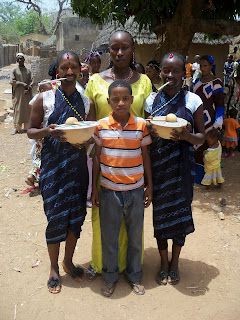After our World Map Mural went so well the director of the Primary School asked me to do another mural, an outdoor one, to beautify the school. Actually, he didn't really ask so much as declared, in a loud, jovial way, that I must come back and do another mural, as soon as possible. I agreed, got my paints together, gridded a little map of Senegal I had lying around, and got to work.
I got this far in one afternoon, but the holes in the wall were a stumbling block. Fortunately, there were some Bassari guys doing a construction project at the school, putting a cement floor in a new classroom, and it was pretty easy to convince them to come put some extra cement in the wall.
After the cement dried I used bits of leftover paint to smooth things over (and because it's fun to smush colors around) and then came back the next day to paint a background for the school title. I also touched up the places where some little kids had scribbled with charcoal and left dusty little hand-prints in the still-tacky paint. Ugh. Kids.
Most of the kids were pretty cute and extremely respectful, actually. They'd sit near me, asking questions, bickering with each other, or reading the names of each department aloud. There was one kid who greeted me and then sat in the shade, making little things out bits of trash and singing made-up songs using the text from the wrappers and tins he was playing with. (He was my favorite.) The morning after that I came back again to add text, a fancy ribbon, and general finishing touches.
The director requested that I write "Discipline - Work - Success" across the bottom, and I obliged, even though it isn't the slogan I would have chosen for an elementary school. I might have gone with something like "Friendship! Learning! Dreams and Rainbows!" or something similarly American, but he's the director and he seems to care about improving the school. I also misspelled "Discipline" but realized it only a couple hours after I'd finished up, while jogging by to admire my own handiwork, so I'm pretty sure corrected it before anyone noticed. Success!
 |
| Spell-Checked. |

















































